 This was quite a turn for Radiant this week, and it’s going to be interesting where it follows this path (when it eventually returns to it, of course). There have been signs from the start that Captain Dragonov was a bit of an odd duck. Not a moustache-twirler at the very least (though we did get one of those later in the episode), which is interesting given his line of work. I see a lot of potential both for good and ill in this setup, but only time will tell what sort of fruit it bears for the series.
This was quite a turn for Radiant this week, and it’s going to be interesting where it follows this path (when it eventually returns to it, of course). There have been signs from the start that Captain Dragonov was a bit of an odd duck. Not a moustache-twirler at the very least (though we did get one of those later in the episode), which is interesting given his line of work. I see a lot of potential both for good and ill in this setup, but only time will tell what sort of fruit it bears for the series.
 The message is straightforward enough here, and it’s laid out by Yaga in no uncertain terms – it’s a mistake to assume everyone in a group is the same, and that mistake can bite you when the time comes to fight. It cuts both ways of course – everyone you assume to be an enemy isn’t evil, but there are bad people among those you consider to be allies, too. It’s only natural that Seth wouldn’t understand this yet, given both his age and the way he’s been treated by the Inquisition. But he’s shown a capacity to learn, which places him above some shounen protagonists to be certain.
The message is straightforward enough here, and it’s laid out by Yaga in no uncertain terms – it’s a mistake to assume everyone in a group is the same, and that mistake can bite you when the time comes to fight. It cuts both ways of course – everyone you assume to be an enemy isn’t evil, but there are bad people among those you consider to be allies, too. It’s only natural that Seth wouldn’t understand this yet, given both his age and the way he’s been treated by the Inquisition. But he’s shown a capacity to learn, which places him above some shounen protagonists to be certain.
 Less straightforward, though, is how Valente-sensei is going to reconcile the picture he paints of Dragonov here with what he represents. We know the Inquisition and the persecution of minorities and foreigners are major areas of interest for the mangaka, and will be important themes in Radiant. Well, historically speaking you’d have to do a lot of convincing to get me believe there were good people on the frontlines of the Inquisition. Dragonov clearly cares about his men – he seems more interesting in fishing and cooking than hunting heretics. He’s seen as a disappointment, in fact, by a new recruit who imagined the “Lynx Eye” to be someone more grand and heroic.
Less straightforward, though, is how Valente-sensei is going to reconcile the picture he paints of Dragonov here with what he represents. We know the Inquisition and the persecution of minorities and foreigners are major areas of interest for the mangaka, and will be important themes in Radiant. Well, historically speaking you’d have to do a lot of convincing to get me believe there were good people on the frontlines of the Inquisition. Dragonov clearly cares about his men – he seems more interesting in fishing and cooking than hunting heretics. He’s seen as a disappointment, in fact, by a new recruit who imagined the “Lynx Eye” to be someone more grand and heroic.
 A contrast to Dragonov is provided in a certain Captain Konrad – once his subordinate, it seems, but now a rising star who’s eclipsed his former superior. It’s one of Konrad’s proteges, Edmund (the twirler) who sends out a distress signal that Dragonov’s ship picks up – his ship has been damaged by a Nemesis and he’s stranded on an island. Dragonov comes to assist, naturally, and it turns out that Edmund’s ship has a hold full of “sorcerers” he’s captured and intends to take back to the capital. Edmund is everything Dragonov is not – vain, opinionated, and full of braggadocio.
A contrast to Dragonov is provided in a certain Captain Konrad – once his subordinate, it seems, but now a rising star who’s eclipsed his former superior. It’s one of Konrad’s proteges, Edmund (the twirler) who sends out a distress signal that Dragonov’s ship picks up – his ship has been damaged by a Nemesis and he’s stranded on an island. Dragonov comes to assist, naturally, and it turns out that Edmund’s ship has a hold full of “sorcerers” he’s captured and intends to take back to the capital. Edmund is everything Dragonov is not – vain, opinionated, and full of braggadocio.
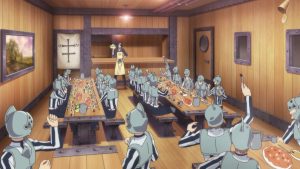 The sight of a bunch of hardscrabble civilians in cages is obviously a rather potent one at the moment, what with what’s going on both in America and Europe. What we don’t know about Dragonov yet – and the answer would tell us a lot about his character – is whether he was bothered by the fact that there were a bunch of sorcerers caged like animals in the hold of Edmund’s ship, or that they weren’t actually sorcerers. Any loyal soldier would do what he did here, knowing a fraud was being committed. But how does Dragonov feel about the mission in the first place, given that putting sorcerers in cages is pretty much his job?
The sight of a bunch of hardscrabble civilians in cages is obviously a rather potent one at the moment, what with what’s going on both in America and Europe. What we don’t know about Dragonov yet – and the answer would tell us a lot about his character – is whether he was bothered by the fact that there were a bunch of sorcerers caged like animals in the hold of Edmund’s ship, or that they weren’t actually sorcerers. Any loyal soldier would do what he did here, knowing a fraud was being committed. But how does Dragonov feel about the mission in the first place, given that putting sorcerers in cages is pretty much his job?
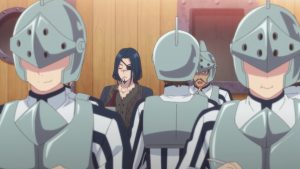 The answer to that question is going to say a lot about not just the captain but Radiant itself, I think. It’s certainly admirable that Dragonov fights Nemesis to protect villages and cares for the welfare of the men who serve him (and drinks wine with a straw). But when your job is to persecute the innocent, does that really matter? But then, there were two halves to Yaga’s lesson to Seth – and even as we learn that there’s more to the Inquisition than can be summed up in sweeping generalizations, we’ve yet to learn the extent to which that’s true of sorcerers. Perhaps they aren’t all as innocent as we’ve been led to believe so far…
The answer to that question is going to say a lot about not just the captain but Radiant itself, I think. It’s certainly admirable that Dragonov fights Nemesis to protect villages and cares for the welfare of the men who serve him (and drinks wine with a straw). But when your job is to persecute the innocent, does that really matter? But then, there were two halves to Yaga’s lesson to Seth – and even as we learn that there’s more to the Inquisition than can be summed up in sweeping generalizations, we’ve yet to learn the extent to which that’s true of sorcerers. Perhaps they aren’t all as innocent as we’ve been led to believe so far…


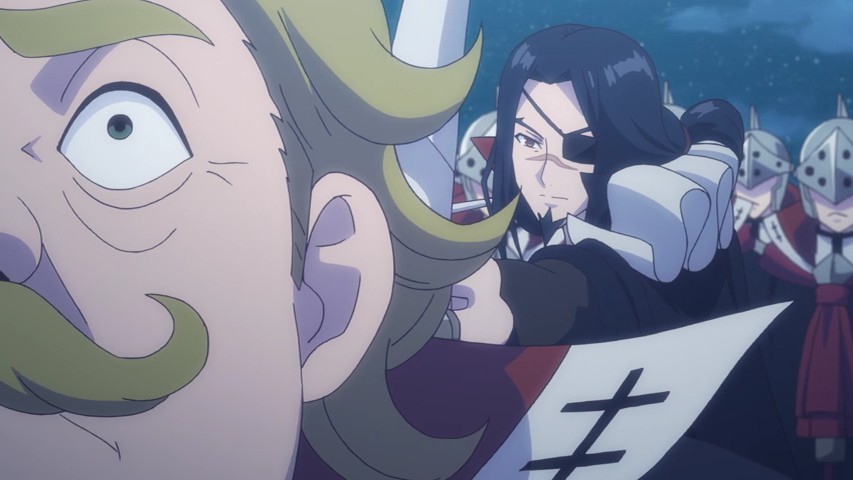

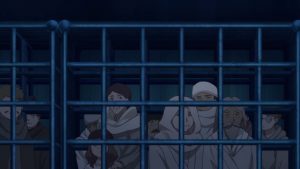





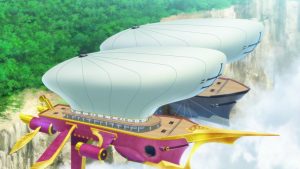
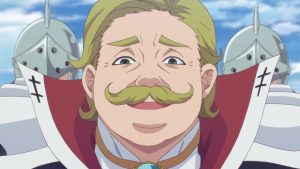
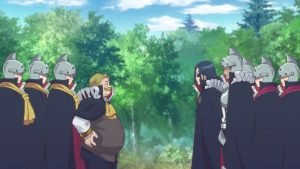

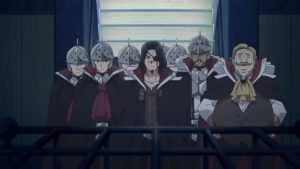



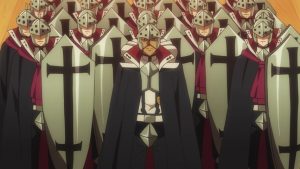


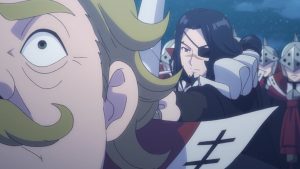
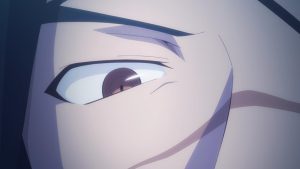



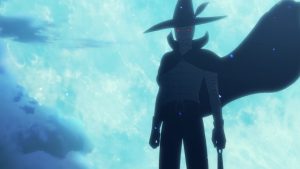





Simone
December 2, 2018 at 11:51 pmTo me, this show feels much like a poor man’s One Piece. There’s a similar ambiguity here, but in One Piece it’s much more well motivated: you have a bunch of unruly pirates, some good and some (most, really) bad, and a Marine that carries out law enforcement but works for a corrupt Government, so they can both protect the people and do some really nasty stuff (including in at least one occasion the complete genocide of an island’s populace in order to keep one of the Government’s dirty secrets). Here the setup is much less rational – the Sorcerers are the only ones able to defeat the Nemesis, so there’s no logical reason to prosecute them. Even though there would obviously be good reason for people to be *suspicious* of them – after all, they are powerful, and as seen with the Bravery Quartet that power can be easily misused – why just try to exterminate them all when that would spell doom for the world? It goes beyond bigotry and into pure idiocy.
Of course any comparisons with the real life Inquisition are pretty much impossible too – it’s possible that in that one there were people who fashioned themselves well-intentioned too, but the fact that they were basically fighting only paranoid delusions rather than a real enemy warrants that they did never anything but evil for the world. At least in THIS fictional world magic is a real thing…
Say
December 3, 2018 at 2:59 amTo me instead it is a bad copy of Fullmetal Alchemist.
– a boy who doesn’t use a tool to do his tricks (Edward / Seth)
– a strong female master
– a quest.
Fundamental information about world building is lacking and I feel emotionally detached, but entertained. Both Tsurune and Kaze ga tsuyoku fuiteru keep being higher in my weekly expectations though they are not masterpieces.